It All Adds Up to Self-Improvement
- Share via
Re “Stumped by the X Factor,” June 6: Your story on algebra brought back memories for me. When I learned I had to take a year of algebra at Santa Monica High School (back when dinosaurs roamed the Earth), I was terrified. I was abysmal in math, horrible, beyond horrible--I once got 52 fraction problems wrong out of 54, and the only thing my teacher wondered was how I got two right. So when I learned I’d have to take algebra, I went to the Santa Monica Library, checked out every possible book on algebra, went home and throughout that summer badgered my brilliant older brother to tutor me. He did.
The next year, under the compassionate and competent teaching of Mr. Caballero (who also taught my brother), I came home with straight A’s in algebra. I liked it. It was different. But I know I would have floundered, too, if I hadn’t had a brother--now assistant professor of Semitic languages at UC Berkeley (John Hayes Jr.)--who gave up an entire summer to help his pesky baby sister. I didn’t appreciate it then. I sure do now.
Lynn Berk
Las Vegas
*
Algebra is vital because it teaches logic and problem solving. Unfortunately, if more of those calling for trained algebra teachers had the logic training, they would understand that those who have the needed algebra training get three times the pay and four times the respect outside the teaching profession.
Another path has to be taken to achieve the goal. A well-written algebra curriculum where the reading/language arts teacher can learn effectively, along with the students, is the only answer that can possibly work. Well-written means a maximum of one day of training before the average current teacher can use the material effectively.
Logic says that we need more adults trained with the logic and problem solving best taught in algebra class. Logic also says that trying to do it with teacher training alone cannot achieve the goal.
Logic, not emotion, should dictate more educational policy decisions.
Larry L. Severson
President, Optimizing National
Education, Fountain Valley
*
Your story about algebra reminded me of what my cousin Amy jokingly told me as a lad in England in the 1930s: Let x equal the unknown; then x equals algebra.
Things haven’t changed much, apparently.
H.J. Orchard
Professor Emeritus
Electrical Engineering, UCLA





